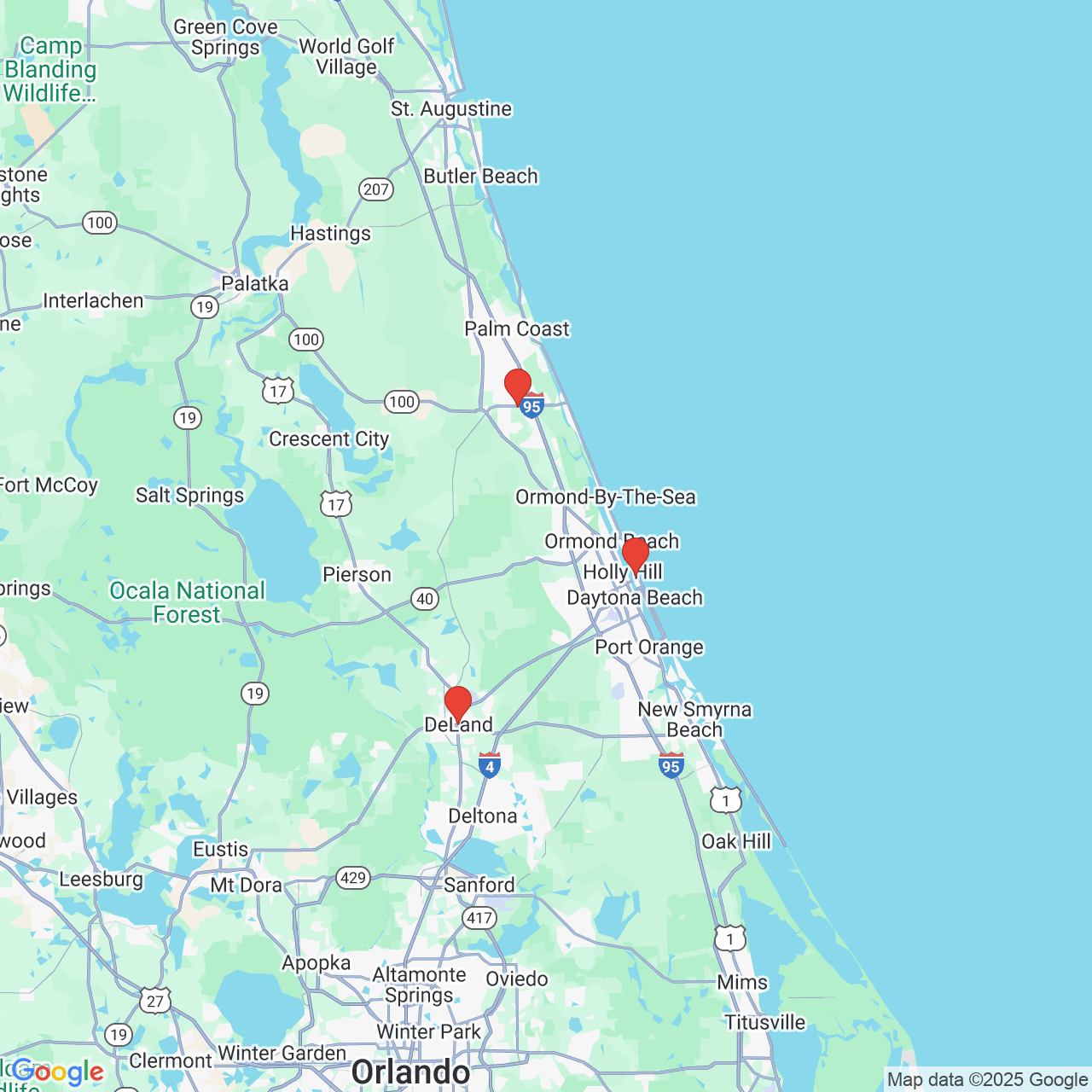Personal Injury Lawyer
Have you or someone you love been injured by an act of negligence? The personal injury lawyers at Chanfrau & Chanfrau can help your family recover the compensation you need to put your life back together.
With offices in Palm Coast, DeLand, and Daytona Beach, FL, we represent clients from all of Central Florida. Could we be the law firm for you? Let's discuss your case during a free consultation.
Our Focus on Personal Injury

5-Star Reviews From Central Florida Clients Representing Daytona Beach, Palm Coast, and DeLand Since 1976
Greg, Lori and the whole staff at the Palm Coast Location were amazing. I was always updated and or told what my next steps would be. The whole staff made me feel like family. They made the whole process less stressful and I would highly recommend their services in the future! Thank you Guys again!
View on Google
All I can say is they handled our case with class, dignity and with a very high level of professionalism. Bill was great representation and covered all aspects of my case thoroughly. If you’re looking for a firm that really cares about your case, this is your firm.
View on GoogleA Client's Testimonial "I'd recommend them to anybody."
Sigfried suffered serious injuries in a motorcycle accident. He's glad that he chose to work with the personal injury attorneys at Chanfrau & Chanfrau in Daytona Beach, FL. Because our lawyers were handling the legal aspect of his personal injury case, he was able to focus on his recovery.
Take the First Step Request a No-Obligation Consultation
After an accident that results in a personal injury, it can be difficult to know where to turn. The best course of action is to consult with a trustworthy personal injury lawyer as soon as possible.
Consultations with our personal injury attorneys are completely free of charge or obligation. During the initial case review, our lawyers will ask questions about your accident and help you understand the path toward fair compensation. At the end of the consultation, you will be able to decide whether we are the right personal injury law firm for you.
You can request your free consultation right now by contacting us online or by calling the office closest to you.
“Really stepped up on my behalf.”
After a 4+ year case, full of ups and downs and frantic moments, I must give credit where credit is due. The Chanfrau and Chanfrau team really stepped up on my behalf. They have made sure everything is as expedited as could be, dealt with my moments of mania, and listened to me when I said there was something wrong.
View on Google
I cannot say enough good things about this law firm. From the front desk to the paralegals to my own attorney, Kelly Chanfrau, I was always made to feel like someone genuinely cared about my situation. Everyone was kind, polite, helpful and caring from start to finish. Thank you, Kelly, Ashley and staff for everything you did for me!!
View on Google
Yes, You Can Afford
a Personal Injury Lawyer
/
At Chanfrau & Chanfrau in Palm Coast, DeLand, and Daytona Beach, FL, we handle personal injury cases on a contingency basis. That means you'll only have to pay us if we successfully recover compensation for you. There are no upfront costs when hiring our law firm, and if your case is unsuccessful, then you won't owe us anything.
Helpful Personal Injury Resources
Insurance companies want to settle claims for as little money as possible and do not have your best interests in mind. Chanfrau & Chanfrau will investigate your case before filing a civil complaint on your behalf. We take clients on a contingency fee basis. If we represent you, we expect to win.
Our attorneys have successfully represented personal injury victims for more than 40 years. We understand the questions people have when they are considering a personal injury lawsuit, and we offer potential clients a free consultation and initial case evaluation by one of our lawyers.

Let's Talk About Your Case
No matter the nature of your personal injury, Chanfrau & Chanfrau can help you and your family. We are dedicated to defending the rights of innocent victims and holding negligent parties accountable.
Our personal injury lawyers are ready to meet with you for a free case review. Set up a time to meet with our attorneys by contacting us online or by calling your preferred location.
Daytona Beach: (386) 258-7313
Palm Coast: (386) 439-7760
DeLand: (386) 222-0299

Injured During Bike Week? We Can Help
Every year, thousands of motorcycle enthusiasts gather in Daytona Beach for Bike Week in the spring and Biketoberfest in the fall. Of course, with that many motorcycles on the road, accidents are inevitable. In fact, during Bike Week 2023, 122 bikers suffered serious injuries in motorcycle accidents, while four motorcycle riders lost their lives.
Our personal injury attorneys have represented motorcyclists injured during Bike Week. Even if you are not from the Daytona Beach area, our lawyers can handle your case.
Not Afraid to Go to Trial: A Strong Reputation in Daytona Beach Courts
We do everything in our power to resolve personal injury cases through negotiation, but sometimes, going to trial is the best avenue to secure all that our clients need to recover. If this is the route your case takes, know that you’re in good hands at Chanfrau & Chanfrau. We are here to see your case through to a favorable resolution.
- Attorney W.M. Chanfrau, Sr. is a board-certified civil trial attorney through the Florida Bar. In practice since 1976, his early work representing insurance companies gives him unique insight on how to best help our clients recover maximum compensation in a courtroom setting.
- Attorney William Chanfrau, Jr., began his career at the State Attorney’s Office before joining his father in practice at Chanfrau & Chanfrau. William is a member of the Southern Trial Lawyers Association and has been named to the National Trial Lawyers Top 100 List every year since 2016.
- Attorney Kelly Chanfrau is a board-certified personal injury attorney who has led the charge on six- and seven-figure victories for our clients. She is a member of the Association of Trial Lawyers of America and is recognized as one of the top 50 female attorneys in the state of Florida.


You Have Limited Time to File a Claim How Florida’s Statute of Limitations Affects Personal Injury Cases
A statute of limitations is a guideline that defines the period of time within which one party can bring legal action against another. Florida recently passed laws that shorten this window of opportunity in personal injury cases. Here are the new guidelines:
If the injury occurred before March 24th, 2023, you have four years to file a personal injury claim. If the injury occurred after March 24th, 2023, you only have two years to file a personal injury claim.
These statutes are strict, so don’t let the opportunity to recover pass you by. It may feel like you have plenty of time but it serves your best interests to contact a personal injury lawyer straight away.
(386) 258-7313
“Nothing short of amazing!”
The team at Chanfrau & Chanfrau was nothing short of amazing! Total engagement in the entire process with our case from start to finish. We were always kept informed along the way and any questions or concerns we had were quickly answered and addressed. We are ecstatic with the results and would absolutely recommend Bill Chanfrau and the Chanfrau team to anyone under similar circumstances. Thanks again for the stalwart job!
View on GoogleAbsolutely a 5 star firm ! Our Attorney was Greg Olsen and he was wonderful. Everyone at the Daytona office is polite, friendly and professional. This was our first time retaining a lawyer so of course we had lots of questions and concerns. They handled everything. Answered all our questions in terms we could understand.This firm truly cares about their clients.
View on GoogleYou Can Still Collect Even If You Were Partially at Fault
If you think you aren’t eligible to be compensated for your injury because you share some of the blame for the accident, don’t lose hope. Thanks to Florida’s pure comparative negligence guideline for determining liability, the resources you need may still be within reach.
Under this rule, you can still be compensated for an injury as long as you were less than 50% at fault for the accident. The total amount you’re eligible to receive is proportionate to your share of fault. For example, in a $100,000 case where an injured party shares 20% of the fault, their compensation pool would be reduced to $80,000.
For many of our clients, this is the first time they’ve found themselves in a complex legal situation, but our attorneys have been here before. Let us listen to the details of your case and help you determine what you may be able to recover during a free consultation.
A Network of Experts To Bolster Your Case
/
Over the years, our Daytona Beach attorneys have developed connections with specialists in all manner of fields pertinent to personal injury law, including physicians, psychiatrists, insurance adjusters, financial experts, and accident scene recreationists. By combining our legal resources with their subject-matter expertise, we can develop even more effective strategies to maximize our clients’ compensation.
What You Can Recover Through a Personal Injury Claim
After an accident that leads to a personal injury, victims suffer a variety of damages. Depending on the circumstances of your case, our Daytona Beach law office can help you recover compensation for:
- Medical bills
- Lost wages
- Lost earning potential
- Emotional trauma
- Property damage
- Loss of consortium
- Funeral expenses
- Potentially more
"A great experience and an amazing outcome."
Signing with Chanfrau & Chanfrau was the best decision I made. In getting into a car accident your not in the best headspace, fortunately I found this firm. Their entire team is very professional and go above and beyond in doing what's best for you. Huge shout out to Kim, she has taken the time to listen to all the medical concerns and I can tell that she truly cares.. If you want a great experience and an amazing outcome this firm is where you need to go!!
View on GoogleI did not know what to expect from Chanfrau & Chanfrau. I was pleasantly surprised when we started on my case. the whole team was wonderful. They totally took over everything. THere was not a lot for me to do since they had everything covered. A great law firm. Thank you so much
View on Google




















